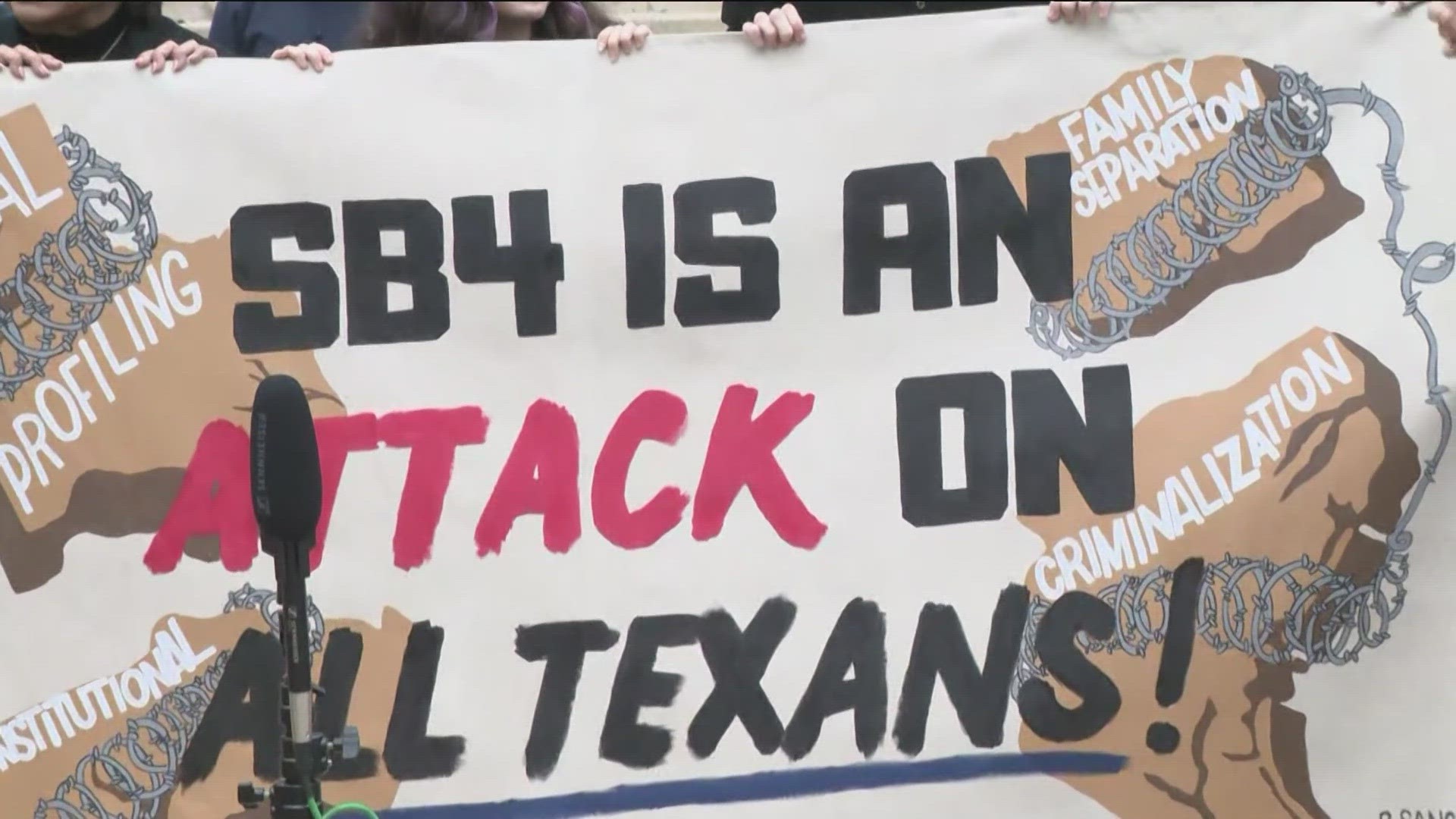TEXAS, USA —
A federal judge in Austin heard arguments over the controversial immigration law, Senate Bill 4, Thursday morning.
Senate Bill 4
The new law would allow state and local police to arrest and remove people suspected of entering Texas illegally. Opponents of the bill say it's unconstitutional because enforcing immigration law is a federal responsibility.
The American Civil Liberties Union of Texas (ACLU), as well as the Department of Justice (DOJ), are suing Texas to stop SB 4. Thursday's hearing aimed to temporarily stop it from going into effect until a final decision is made on the lawsuit. The law is scheduled to go into effect in March.
"For those of us who are sitting in Texas, it is critical that we have the protection of the federal Constitution and Civil Rights laws, and at the point where the state of Texas is claiming the authority to suspend them, that's something that should make all of us very afraid and apprehensive," said David Donatti, the senior staff attorney for the ACLU of Texas.
Texas lawmakers passed the controversial legislation last November during their fourth special session. Gov. Greg Abbott applauded the legislation before signing it in December. When he signed the bill, Abbott said Texas needed to defend itself and blamed President Joe Biden's immigration policies.
Abbott said he thinks the law will survive the legal challenges, but he has said that his is prepared for the case to possibly go all the way up to the U.S. Supreme Court. U.S. District Judge David Ezra also said he's confident it will make it to the Supreme Court.
The Hearing
During Thursday's hearing, the DOJ attorneys brought up concerns about how the new law could affect the federal government's foreign relations. In court, they argued that SB 4 would remove noncitizens to Mexico regardless of their citizenship, so if Mexico rejects that person, it would interfere with the government's foreign affairs with the country.
Another argument from the DOJ was that the federal government had been fulfilling its duties at the border. Several authors of SB 4 argue that the necessity for the law comes from the fact that the federal government hasn't been doing its job with border security.
The DOJ refuted that argument, saying that it apprehended more than 400,000 people in 2023, which is more than any other single year.
Judge Ezra took issue with one part of the law in particular, the Abatement Clause. Under Senate Bill 4, the court can't throw out a charge against someone for entering Texas illegally, even if their federal immigration status is pending or if an asylum claim could be initiated.
Ezra told the state attorneys that this abatement clause, "slaps the federal immigration law right in the face."
Another issue Ezra brought up is the fact that SB 4 could create a slippery slope precedent that other states could follow. He worries that if people see what Texas is doing with SB 4, they may be inspired to create their own state law, which then could turn the nation into a confederation of states with all sorts of different immigration laws.
Ezra hinted at his decision saying he will make a ruling soon so the state has time to file an appeal before the law goes into effect next month.
RELATED: New state law increasing penalty for human smuggling or operating stash houses now in effect
Texas Legislation Response
Texas Attorney General Ken Paxton responded to the federal court filing, saying that the bill does not create conflict between the state and federal governments since Senate Bill 4 mirrors federal policy.
"SB is recognizing the obvious that the federal government has walked away from their responsibilities at the border. The litigation on SB4 by Sen. Perry will work its way through the courts and all the way to the Supreme Court, and then we will wait to see what the answer is," State Senator Paul Bettencourt (R-Houston), a co-author of SB 4, said in a statement.
Immigration Advocacy
Before the hearing, border residents who are against the new law and other advocacy groups who say they will be directly impacted by it, held a news conference to demand a halt in what they call the "anti-immigrant bill."
The ACLU said the law promotes racial profiling and it allows police to arrest people over suspicions about their immigration status, which they say is unconstitutional since it's the federal government's job to enforce immigration laws.
"What SB 4 does is punishes you based on your identity, where you were born, where you are from, what your status is. And so those perceptions of status in the hands of individual officers of over 2,700 independent law enforcement agencies in the state of Texas, we can imagine that it will be fraught with racial profiling and abuse." Donatti said.

